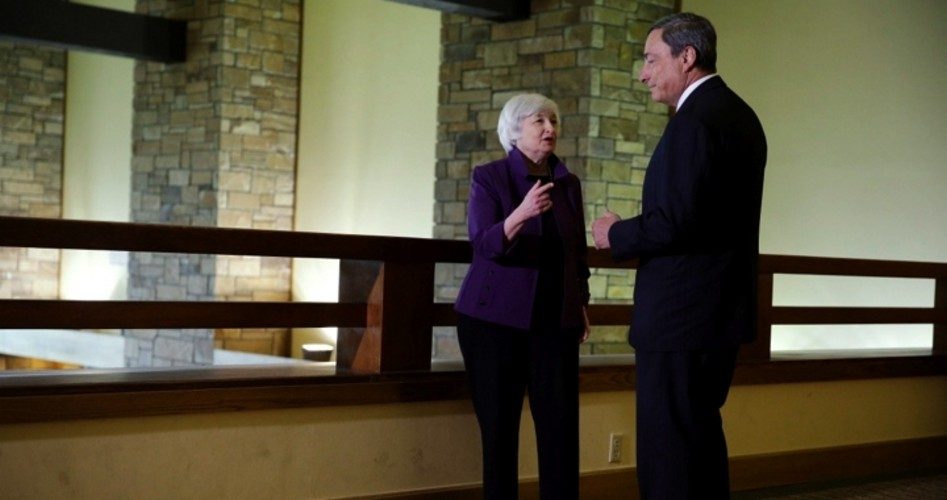
The Federal Reserve’s recently concluded 2014 Jackson Hole Economic Policy Symposium, a conclave of the world’s top central bankers and their privileged economist cohorts in picturesque Jackson Hole, Wyoming, does not bode well for the global economy. European Central Bank (ECB) chief Mario Draghi (shown, at right) provided the big news, with a speech that indicated the ECB will be adopting the Fed’s policies of the past several years, principally “quantitative easing” (QE), a Fed neologism for currency debasement, or counterfeiting by computer entry. Under former Federal Reserve Chairman Ben Bernanke and his successor Janet Yellen (shown, at left), the Fed has magically conjured up more than $4.4 trillion out of thin air — and shoveled much of that into the palms of their fellow bankers.
Like the Fed, the ECB may well go on a huge bond-buying spree, creating trillions of new euros. This was really not “news,” however, since Draghi and the ECB had already embarked on their QE counterfeiting gambit at least as far back as the beginning of June with their direct buying of government bonds.
Ambrose Evans-Pritchard reported for the Telegraph (U.K.) on June 4 regarding what he described as the ECB’s “revolutionary move”:
The European Central Bank has become the first of the world’s monetary superpowers to cut its deposit rate below zero, taking a leap into the unknown as it tries to drive down the euro and head off deflation.
The bank opened the door to direct purchases of private assets or quantitative easing, and announced a €400bn blast of long-term lending at cheap rates for banks.
The benchmark interest rate was cut to a record low of 0.15pc, tantamount to zero. The revolutionary move was to lower the deposit rate to -0.1pc, forcing banks to pay a charge if they continue to park money for safekeeping in Frankfurt.
But that was only the opening round, presaging much larger actions to come, as Draghi made clear. “Are we finished? The answer is no,” said Draghi. “If required, we will act swiftly with further monetary policy easing. The Governing Council is unanimous in its commitment to using unconventional instruments within its mandate should it become necessary to further address risks of prolonged low inflation.”
That announcement by Draghi back in June was a public signal that the ECB was on track to usurp more economic powers, as Ben Bernanke had urged it to do in 2012. (See: Europe Must Further Centralize Fiscal Power, Claims Fed Boss Bernanke.)
The ECB’s rate cuts in June caused tremors throughout the EU, especially in Germany, where Draghi’s ultra-loose monetary policy and usurpation of powers were denounced as autocratic and dictatorial.
“More and more money is not a panacea,” the Süddeutsche Zeitung editorialized. “That is a task for the politician — not the central banker.”
Georg Fahrenschon, the head of the German Association of Savings Banks, accused the ECB of raiding the savings of the thrifty. “We are tearing a hole in the pensions of savers. Over time these low rates will destroy the value of assets,” he said.
Savers will be penalized — again — while the politically connected “insider” bankers will walk away with more hoards of expropriated cash. Draghi, of course, is a former Goldman Sachs executive. And many of the central bankers and economists who annually gather at Jackson Hole are likewise “former” Wall Street executives and attendees/members of secretive gatherings of the global elite at Bilderberg, the Council on Foreign Relations, Trilateral Commission, and Chatham House.
Again, Evans-Pritchard reported on the privileged benefits that the ECB’s QE policy will shower on those who are connected:
David Owen, from Jefferies Fixed Income, said the lending measures offer more than meets the eye and amount to a mini-bazooka. “Draghi has drawn a line in the sand and is telling us that he is not going to raise interest rates for four years. This is highly significant,” he said.
Banks will be able to borrow €400bn for four years at near zero rates at LTRO (long-term refinancing operation) auctions in September and December. The magic is in the details. While the sums are far lower than earlier LTRO auctions, the banks will be able to tap the ECB for funds equal to 7pc of their private loan book without using up collateral. “They can get free money for four years so long as they lend it to the real economy,” he said.
The groundwork for this latest ECB move was laid many months before even the June LTRO auctions, and certainly long before it was publicly unveiled at Jackson Hole.
Max McKegg, managing director of Technical Research Limited, points out that the ECB signaled in 2013 it was getting ready for Fed-type “unlimited” bond purchases under the rubric of “Outright Monetary Transactions (OMT).”
In an article for tradingfloor.com on August 25, McKegg notes an important ECB speech that forecast Draghi’s later announcements. “Well, consider this statement in a September 2013 speech by Benoit Coeure, a member of the Executive Board of the ECB, when discussing the Outright Monetary Transactions (OMT) program (a plan to buy unlimited quantities of government bonds),” says McKegg. “The ECB had introduced it the previous year when fears of a split-up of the EUR were at their height (but is has not yet been used).” Here is the quote by ECB’s Benoit Coeure:
OMTs are not just words: the ECB is fully prepared to use them. For the Governing Council of the ECB there is only one single, deciding criterion and that is the maintenance of price stability in the euro area. This overarching criterion has shaped the design of OMT’s and it determines its potential activation.
McKegg observes that Draghi’s “track record suggests he will take action.” That action will cause huge consequences for taxpayers, savers, investors, businesses, and consumers not only inside the European Union, but worldwide.
Photo of Fed Chair Janet Yellen and ECB President Mario Draghi at Fed Symposium in Jackson Hole: AP Images
Related articles:
Central Bankers Prepare to Flood the World with More Funny Money
Your Savings, 401(k), and Retirement Are in Danger
Jackson Hole Conclave: Central Bankers Plan Global Theft, Massive Pain
Former Fed Official “Sorry” for QE Looting of Public to Enrich Wall Street
Rand Paul Commits to Tie Yellen Nomination to Audit the Fed Bill



